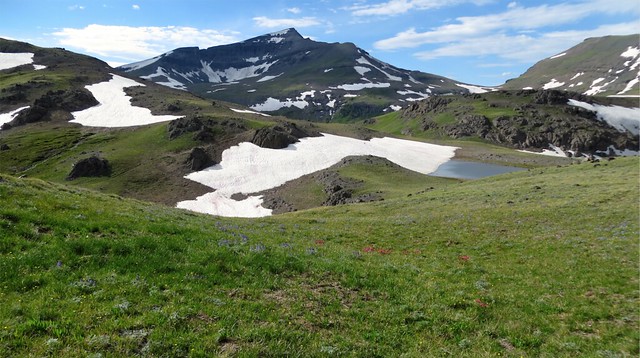After three days wandering off trail along the Continental Divide, we reached the beating heart of wild America. Before us: the headwaters of the Yellowstone River, an elk’s bugle from the point farthest from a paved road in the lower-48. Less than halfway into our weeklong, eighty-mile journey through northwest Wyoming, we’d already encountered more wildlife than we had seen in years of backcountry travel.
 Photo by Tim Lumley The Yellowstone River as it winds through Wyoming. Public lands are where many westerners live life to the fullest.
Photo by Tim Lumley The Yellowstone River as it winds through Wyoming. Public lands are where many westerners live life to the fullest.
It was our layover day, time to climb to the sacred source of the Yellowstone and trade our fifty-plus pound packs for something a little lighter. I’d dreamed of this moment. The previous night’s thunderstorm — the type that makes you wonder if you’ll live to see another day — had left me sleepless and on edge.
Blue skies beckoned beyond our frost-covered tent. We struck out with high hopes across wide-open terrain. It wasn’t long before the tables turned. At a saddle before our final push, a brown giant peered down at us, only a hundred yards upslope. Our hearts pounded. Hump distinctly visible, the bear woofed, turned, and ambled out of sight. It was the fourth grizzly of the trip. We scanned for additional critters. Should we continue?
* * *
Many Americans would wonder what my wife and I were doing on that remote mountainside, dozens of miles from pavement, no one to call for help. But here in the West — and everywhere public lands are found — we feel the pull of empty spaces on the map. In the wild, our terror is our joy. Our isolation is our freedom. Refugees from modern civilization, we search for spiritual renewal, exercising our God-given quads in pursuit of our inalienable rights. For some, an experience like this might happen once-in-a-lifetime. For others, it’s a weekly ritual.
Our American birthright is 640-million acres of public land that belong to you and me. On April 15 — tax day — we make a mortgage payment on this land. Every time we fill a glass of water, cast a fly, or bask in alpine splendor, we reap the rewards of ownership.
As Westerners, public lands are where many of us live life to the fullest. Republican or Democrat, if we are lucky enough to enjoy these corners of wild America, our prized memories often harken back to experiences shared with people we love in places we can’t think of living without.
 photo by Zack PorterA view from the author’s weeklong journey though the headwaters of the Yellowstone River in Wyoming’s Teton Wilderness.
photo by Zack PorterA view from the author’s weeklong journey though the headwaters of the Yellowstone River in Wyoming’s Teton Wilderness.
At the age of 18, exhausted from battling years of depression, I found a friend in wild places and a new lease on life when I went to work for the Forest Service in Washington’s North Cascades. Public lands are where my wife and I were engaged, and where we brought our daughter within days of her birth. We’re a family of modest means and a 900-square foot house. But we’re downright wealthy every time we pull off on a dirt road and begin a new adventure.
It seems unconscionable, then, that elected officials would dare squander our heritage. In the first days of 2017, House Republicans made it easier to transfer federal lands, voting to prohibit calculation of lost revenue to taxpayers in land sales. In my home state of Montana, legislators led by State Senator Jennifer Fielder, CEO of the industry-funded, anti-public lands American Lands Council, are peddling resolutions to sell or transfer federal lands to the states. Opponents point out that state taxpayers would be saddled with astronomical management costs, which might force land selloffs to corporations and the wealthy and reduce public access. All of this despite the fact that a January 2017 Colorado College poll shows 56 percent of Westerners and 58 percent of Montanans oppose sale or transfer of federal public lands.
Our new Secretary of Interior, former Congressman Ryan Zinke (R-MT), claims to be a political descendent of President Theodore Roosevelt. But Zinke’s record shows that he has supported the sale or transfer of public lands in vote after vote, and done little to support conservation. It’s up to us to hold Zinke and other officials accountable, or risk losing what we love most about the West.
Thousands have rallied in state capitols across the West in recent months in defense of public lands. The resistance is working: after introducing a bill (HR621) to transfer three million-acres of public lands, Rep. Jason Chaffetz (R-UT) withdrew it due to public outcry.
* * *
In this climate of greed, bullying, and compulsive scapegoating, we need places for quiet reflection and contemplation. Places where we are humbled by our insignificance, but also given renewed faith in our agency. Places where we are made to feel the stranger in a foreign land. Places that say: “Come as you are.”
Our Yellowstone River pilgrimage did not turn out as planned. Shortly after the day’s first ursine encounter, we spotted six more grizzlies blocking our path to the summit. Giddy with adrenaline, we watched the spectacle as long as fear allowed before turning around, awed by what we had witnessed, content to come up short of our goal.
It was just another day on America’s public lands.
We don’t have a paywall because, as a nonprofit publication, our mission is to inform, educate and inspire action to protect our living world. Which is why we rely on readers like you for support. If you believe in the work we do, please consider making a tax-deductible year-end donation to our Green Journalism Fund.
Donate